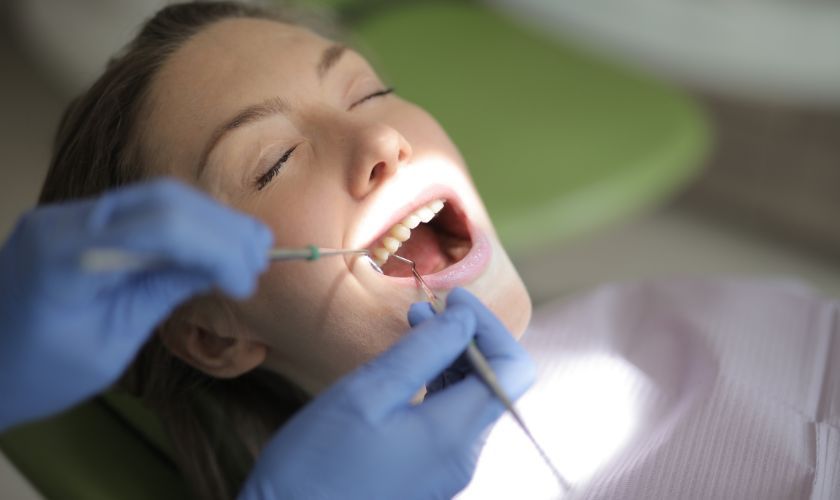In a Dental Crisis? Don't Worry, the Emergency Dentist is Here!
A dental emergency can strike unexpectedly, causing immense pain, discomfort, and anxiety. Whether it's a severe toothache, a broken tooth, or a knocked-out tooth due to an accident, such situations require immediate attention. In times of dental crisis, there is a reassuring figure ready to step in and provide swift, expert care: the emergency dentist. This blog explores the crucial role of emergency dentists, their ability to handle urgent dental situations, and the comfort they bring to patients during these challenging times.

What is a Dental Emergency?
A dental emergency is any situation that requires immediate dental attention to alleviate pain, prevent further damage, and preserve oral health. Some common dental emergencies include:
- Severe Toothache: Intense, persistent tooth pain often indicates an underlying issue that requires immediate attention.
- Fractured or Broken Tooth: A broken tooth can be painful and leave the inner structures vulnerable to infection.
- Knocked-Out Tooth: If a tooth is knocked out, prompt action can increase the chances of successful reimplantation.
- Dental Abscess: A painful, pus-filled infection that can lead to serious health complications if left untreated.
- Loose or Dislodged Tooth: An injury or accident may cause a tooth to become loose or partially dislodged.
- Lost Filling or Crown: Without proper protection, the affected tooth becomes vulnerable to further damage.
- Broken Orthodontic Appliances: Damaged braces or wires can cause discomfort and require immediate repair.
The Emergency Dentist: A Reliable Savior
When faced with a dental crisis, it is essential to seek professional help immediately. An emergency dentist is a highly-trained dental professional who specializes in handling urgent dental situations. Their expertise, coupled with state-of-the-art equipment and a calm demeanor, makes them the ideal choice for addressing dental emergencies promptly.
- Round-the-Clock Availability: Dental emergencies can occur at any time of the day or night. Emergency dentists are well aware of this fact, and many dental practices offer 24/7 availability to ensure patients receive timely care when they need it the most.
- Swift Response: Time is of the essence in a dental emergency. Delaying treatment can lead to further complications and worsen the patient's condition. Emergency dentists are trained to act swiftly, providing immediate relief and assessing the situation with efficiency.
- Comprehensive Expertise: Emergency dentists possess extensive knowledge and experience in handling a wide range of urgent dental problems. They are skilled in diagnosing the issue accurately and formulating the most appropriate treatment plan to address it effectively.
- State-of-the-Art Equipment: Modern emergency dental practices are equipped with advanced technology and tools that aid in diagnosis and treatment. From digital X-rays to intraoral cameras, these tools enable emergency dentists to provide precise and efficient care.
- Pain Management: Dental emergencies are often accompanied by intense pain and discomfort. Emergency dentists are well-versed in pain management techniques, ensuring patients are as comfortable as possible during their treatment.
Handling Common Dental Emergencies
Let's take a closer look at how emergency dentists handle some of the most common dental emergencies:
- Toothaches: An emergency dentist will perform a thorough examination to identify the cause of the toothache. Once the source of the pain is determined, appropriate treatment, such as a root canal or tooth extraction, will be administered.
- Fractured or Broken Teeth: Depending on the severity of the fracture, the emergency dentist may restore the tooth using dental bonding, dental veneers, or a dental crown. In more severe cases, a root canal may be necessary.
- Knocked-Out Tooth: Time is critical in this situation. The emergency dentist will carefully handle the knocked-out tooth, gently rinse it (without scrubbing), and try to reinsert it into the socket. If reimplantation is not possible, the dentist will discuss other options, such as a dental implant or bridge.
- Dental Abscess: An abscess requires immediate attention to prevent the spread of infection. The emergency dentist may drain the abscess and prescribe antibiotics to combat the infection.
- Lost Filling or Crown: The emergency dentist will clean the affected tooth and replace the lost filling or crown to protect it from further damage.
Tips for Dealing with Dental Emergencies Before Reaching the Dentist
While seeking professional help is crucial during a dental emergency, certain measures can be taken at home to alleviate discomfort and prevent further damage:
- Toothache: Rinse the mouth with warm water, floss gently to remove any trapped debris, and take over-the-counter pain medication if needed.
- Knocked-Out Tooth: Try to reinsert the tooth into the socket (if possible) and keep it moist by placing it in milk or saline solution until you reach the emergency dentist.
- Broken Tooth: Rinse the mouth with warm water and apply a cold compress to reduce swelling. Gather any broken tooth fragments and take them with you to the dentist.
- Lost Filling or Crown: If possible, use dental cement (available at pharmacies) to temporarily secure the crown or filling until you can see the emergency dentist.
Conclusion
A dental crisis can be a distressing experience, but knowing that emergency dentists are readily available to provide swift and effective care offers much-needed reassurance. These dental heroes possess the expertise, state-of-the-art equipment, and compassion to handle urgent situations and restore smiles to their full glory.
